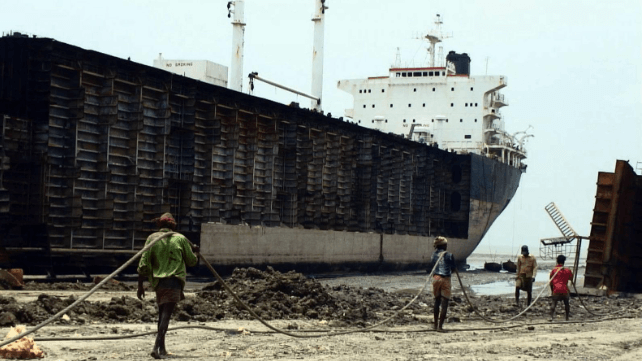BIMCO Calls for Recognition of Non-EU Shipbreaking Yards

A report commissioned by the shipping industry trade group BIMCO highlights that while the EU list of approved ship recycling facilities continues to grow, new additions have not added significant capacity to meet the demands of the global shipping industry. In a controversial move because of environmental and safety records for Asian shipbreaking facilities, the trade group is calling for increased recycling capacity to meet the industry demands by shifting the focus towards adding facilities outside of the EU.
“Today, there are still no facilities from the main recycling states such as India, Bangladesh or Pakistan included on the EU list to meet the demand for recycling of larger ships,” says David Loosley, BIMCO’s Secretary General and CEO. “We believe focus on getting some of these facilities added to the list should be increased if they meet the standards of the Hong Kong Convention, which we believe should be ratified as soon as possible.”
BIMCO argues in its new report that many yards in Asia and neighboring regions have made significant efforts toward upgrading their facilities. They also content that the audit system within the EU regulations works citing that two Turkish yards were removed from the list in September for failings. BIMCO is pleased to note that the EU audit system is working as intended in identifying failings in the auditable systems and react with punitive actions if needed, the group says while contending that the audit system also works for non-EU recycling facilities.
Environmental groups such as the NGO Shipbreaking Platform however argue that that shipbreaking in South Asia “uses unsafe and unsustainable practices that are dangerous for the environment and the workers at the dismantling sites as well as to the surrounding communities.”
Every year, around 800 large ocean-going vessels are dismantled, and about 75 percent of them end up at one of the three beaches in South Asia, Chattogram in Bangladesh, Alang in India, and Gadani in Pakistan, reports NGO Shipbreaking Platform. Between April and June 2022, they report that 143 ships were dismantled worldwide with 65 percent going to South Asia. The BIMCO report says that shipowners worldwide continue to “swap flags” using various methods to remove the ships from the EU with way stops such as in the Persian Gulf region before proceeding to the Asian scrapyards. India for example has increased efforts to turn around ships arriving with false identities but accepts the vessels that have been traded to middlemen to meet the EU requirements.
BIMCO cites the growing need for approved recycling facilities for large, ocean-going ships as the industry begins the anticipated transition tied to the effort to meet new regulations and reduce carbon emissions. The report highlights the strategic importance of ship recycling within the overall strategy of the EC saying it is becoming increasingly clear and important. According to the EC, the “European New Green Deal” and the supporting circular economy are core elements of its attention and spending for the foreseeable future.??

that matters most
Get the latest maritime news delivered to your inbox daily.
EU member state facilities BIMCO argues in general only provide bespoke local solutions to a niche recycling market or are focused on offshore decommissioning. “This means they are not dedicated to the recycling of large ocean-going ships and therefore do not have sufficient capacity,” they write in the report.
The report shows that currently Turkey is the only major ship recycling nation contributing significant capacity to the EU List. While there are efforts to develop new recycling facilities in Europe, they are mostly niches while the majority of tonnage continues to be processed in the South Asia yards. BIMCO believes it is critical for the EU to expand the capacity recognizing the need and trends in the industry.
